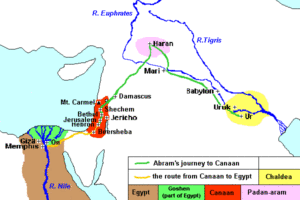Why would I call Abram a Sheikh? (That’s probably not how you think of the Abraham of the Bible account.)
Terah took Abram his son … and they went forth together from Ur of the Chaldeans to go into the land of Canaan, but when they came to Haran, they settled there. – Genesis 11:31 excerpt
Unless you are an archaeologist, ancient history enthusiast or Old Testament scholar you likely have never looked at Abram, Ur, Haran and the history surrounding God’s calling of Abraham to the Promised Land in any light of factual life at that time.
Let’s back up just a little bit. (& in case you missed the introduction to this: Sons of Tradition)
Genesis 11:
24 When Nahor had lived 29 years, he fathered Terah. And Nahor lived after he fathered Terah 119 years and had other sons and daughters.
26 When Terah had lived 70 years, he fathered Abram, Nahor, and Haran. Now these are the generations of Terah. Terah fathered Abram, Nahor, and Haran; and Haran fathered Lot. Haran died in the presence of his father Terah in the land of his kindred, in Ur of the Chaldeans.
Why did Terah leave Ur? Moses’ account of Genesis does not tell us.
We do know this however; Abram would have been a man of stature in his tribe, already married and also responsible for the son of a younger brother who had died after fathering Lot.
29 And Abram and Nahor took wives… 31 Terah took Abram his son and Lot the son of Haran, his grandson, and Sarai his daughter-in-law, his son Abram’s wife, and they went forth together from Ur of the Chaldeans to go into the land of Canaan, but when they came to Haran, they settled there.
 Ur, the city they left was a kingdom.
Ur, the city they left was a kingdom.
The paragraphs which the author of the “Cave Treasures” devotes to the history of Terah and Abraham throw new light upon the lives of these patriarchs and the conditions under which they lived in the city of Ur, and they contain many interesting details which are not recorded in the Book of Genesis, and some new information concerning the overthrow of the city of Ur by the “Wind Flood.” It is quite clear that Terah and Abraham were great, powerful and wealthy shêkhs, and their large flocks of sheep and goats and herds of camels suggest that they were owners and breeders of cattle on a large scale, and masters of caravans. Source.
… recent excavations at Ur have brought to light that in Abraham’s day the inhabitants of the city were given up wholly to idolatry, their chief object of worship being Nannar, the Moon-god.
Further research suggests a possible extra-Biblical motive for Terah’s move of his family to Haran.
… the moon’s crescent was Nannar / Sin / El’s symbol. He was patron god over the city of Ur. Nannar’s temple in Ur was Egishnugal “House of the Seed of the Throne” Biblical Terah, Abraham’s father was one of its high-priests.
Just like the Biblical account of God’s intervention at the Tower of Babel, it would seem from other ancient texts that God was involved in the “wind flood” which devastated Ur during the days of Terah.
The powerful prince moved his caravans and his households northwest along the Euphrates until Teran and Abram settled into Haran, where they were still rich and powerful Sheiks.
One last word of definition before we continue on Abraham’s long journey:
Sheikh – شيخ
Shekh— is an honorific title in the Arabic language. It commonly designates the ruler of a tribe, who inherited the title from his father. “Sheikh” is given to a royal male at birth.
![Photo of 2 sheiks. شيوخ šuyūḫ [ʃuju:x])—also transliterated sheekh, sheik, sheyikh, shaykh, shayk, shekh, shaik and shaikh—is an honorific title in the Arabic language.](https://talkofjesus.com/wp-content/uploads/2016/06/Sheikhs-Royal-Princes.jpg)

Leave a Reply